英语构词法-派生法
- 格式:ppt
- 大小:495.00 KB
- 文档页数:27
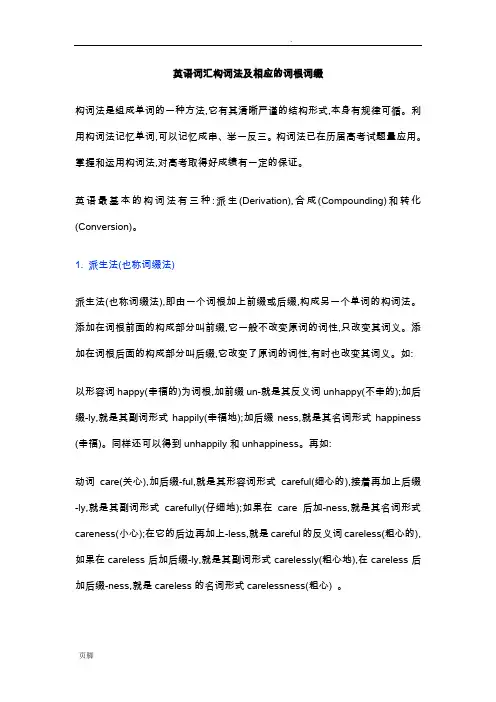
英语词汇构词法及相应的词根词缀构词法是组成单词的一种方法,它有其清晰严谨的结构形式,本身有规律可循。
利用构词法记忆单词,可以记忆成串、举一反三。
构词法已在历届高考试题量应用。
掌握和运用构词法,对高考取得好成绩有一定的保证。
英语最基本的构词法有三种:派生(Derivation),合成(Compounding)和转化(Conversion)。
1. 派生法(也称词缀法)派生法(也称词缀法),即由一个词根加上前缀或后缀,构成另一个单词的构词法。
添加在词根前面的构成部分叫前缀,它一般不改变原词的词性,只改变其词义。
添加在词根后面的构成部分叫后缀,它改变了原词的词性,有时也改变其词义。
如: 以形容词happy(幸福的)为词根,加前缀un-就是其反义词unhappy(不幸的);加后缀-ly,就是其副词形式happily(幸福地);加后缀ness,就是其名词形式happiness (幸福)。
同样还可以得到unhappily和unhappiness。
再如:动词care(关心),加后缀-ful,就是其形容词形式careful(细心的),接着再加上后缀-ly,就是其副词形式carefully(仔细地);如果在care后加-ness,就是其名词形式careness(小心);在它的后边再加上-less,就是careful的反义词careless(粗心的),如果在careless后加后缀-ly,就是其副词形式carelessly(粗心地),在careless后加后缀-ness,就是careless的名词形式carelessness(粗心) 。
前缀、后缀是构词的要素,具有一定的作用和意义。
懂得了前后缀的含义,就容易了解由前(后)缀和词根结合而成的单词的意义。
现把英语中我们常见的前后缀列举如下:1)前缀anti-反对: antisocial反社会的auto-自: automobile小汽车,autonomy自治bi-双: biannual 一年两次的, bicycle自行车by-在旁:bystander 旁观者, by-product副产品co- 同: co-operation合作,co-existence共处,co-worker同事counter-反:counter-attack反攻,counter-revolutionary反革命的dis-否定,除去: discover发现,disorder混乱,杂乱en-使成为: enable使能够,enslave奴役, encourage鼓励extra-外: extraordinary非常的,格外的for-,fore-,先,前,预: forward向前,foresee 预见,forearm前臂,foretaste先尝for-禁,弃: forbid禁止,forget忘记,forgo放弃in-,il-,im-,ir-不,非: informal非正式的,incomplete不完全的,indefinite不定的,illegal非法的,immoral不道德的,irregular不规则的inter-间,相互:internationalism国际主义,interview会见micro-微: microscope显微镜,microfilm微型胶片mid-中:midday 中午,midnight夜半,mid-autumn中秋的mis-误: misunderstand 误会,misuse误用,misfortune不幸non-非,不:non-moral非道德围的,nonsense胡言,nonexistent不存在的post-后于: postwar战后的pre-先于: prewar战前的re-重,再,复: rewrite重写, return返回, review复习super-上,超: superman超人,supermarket 超级商场tele-远: telephone,telescope望远镜,television电视un-不: unable不能的,unimportant不重要的,untrue不真实的vice-副:vice-chairman副主席,vice-premier副总理2)后缀-age状态,集合: marriage婚姻, shortage缺少,village 村庄-an人: American美国人,Italian意大利人,意大利籍,African 非洲人-ation,-ition动作,状态:determination决心,industrialization工业化,preparation 准备,competition竞争,repetition重复-dom状态,领界: freedom自由,kingdom王国-eer人: engineer工程师,volunteer志愿者-er人,动作者:fighter战士,worker工人,writer作家,thinker思想家,harvester收割机-ese人,语言:Chinese中国人,中文, Japanese日本人,日文-ess女性:actress女演员,princess公主,goddess女神-hood身分,境遇,状态: childhood 童年,womanhood女性-ian人: musician音乐家, guardian卫护者, Christian基督教徒-ism主义,教:communism共产主义,socialism社会主义,revisionism修正主义-ist主义者,人: communist共产主义者, artist 艺术家-ity (抽象名词): possibility 可能性, ability能力,equality平等-man人: Englishman英国人,英格兰人, postman邮递员-ment运动,结果: movement运动,development发展,judgement判断-ness状态,性质:kindness和善,carefulness小心,correctness正确,tiredness疲倦-or人,动作者: actor男演员,visitor访问者-ship状态,身份: friendship友谊,comradeship同志之友谊,sportsmanship 体育道德,hardship苦难-sion动作,状态: tension紧状态,revision修订-tion动作,状态: attention注意,action行动-less无:fearless 无所畏惧的,careless 不小心的,useless 无用的,meaningless 无意义的-ly品质,的: comradely 同志般的, friendly 友好的, weekly 每星期的-some引起,适于,易于: troublesome 烦人的,tiresome 令人感到厌倦的2. 合成法(也称复合法)把两个单词或两个以上的词合成一个新词,这种构词的方法叫做合成法。
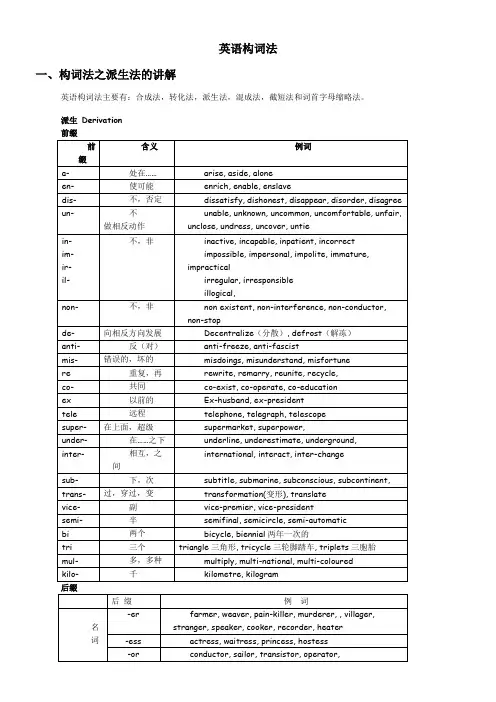
英语构词法一、构词法之派生法的讲解英语构词法主要有:合成法,转化法,派生法,混成法,截短法和词首字母缩略法。
派生 Derivation前缀后缀注意:-ese, -ian, -ist 既可以构成名词,又可以构成形容词。
二、课堂巩固练习Ⅰ.Match the right words from the right column with the words on the left.( ) 1. enrich A. trying to find jobs( ) 2. semicircle B. remove, get rid of ice, frost( ) 3. troublesome C. of, having, using imagination( ) 4. sharpen D. make or become sharp( ) 5. job-hunting E. half a circle( ) 6. limitless F. causing trouble( ) 7. imaginative G. make rich, improve in quality, flavour, etc.( ) 8. defrost H. without limitⅡ.Use the appropriate form of the words to fill in the blanks.1. The mother didn’t know why her daughter was crying _______. (noise)2. He was one of the best _______ in yesterday’s football match. (play)3. Look! How ______ Kate is laughing! (happy)4. It snowed _____ last night and now the streets are covered with snow. (heavy)5. Edison was a great ______. During his life he had many ______. (invent)6. More and more _____ have come to visit China over these years. (foreign)7. We want _________ reasons for your failure to help. (satisfy)8. Please give me some reference work. It will ______ my task. (simple)9. The boy had the _______ of being half starved. (appear)10. The police have _______ a plot against the President. (cover)11. The doctor said that Mary’s mother needed an _______.(operate)12. She hoped that her son would become a _______. (music)13. Few ______ words made us excited. (speak)14. The days on the moon get hotter than ______ water. (boil)15. Thank you for your _________. (kind)16. Many college students work while they are studying because they want to make some money for their college _____. (expensive)17. Most international ______ letters are written in English, too. (busy)18. The boy noticed an ______ mistake on his paper, but he decided not to say anything about it. (correct)19. When in Rome, do as the _____ do. (Rome)20. The teacher was pleased with her _______. (honest)。
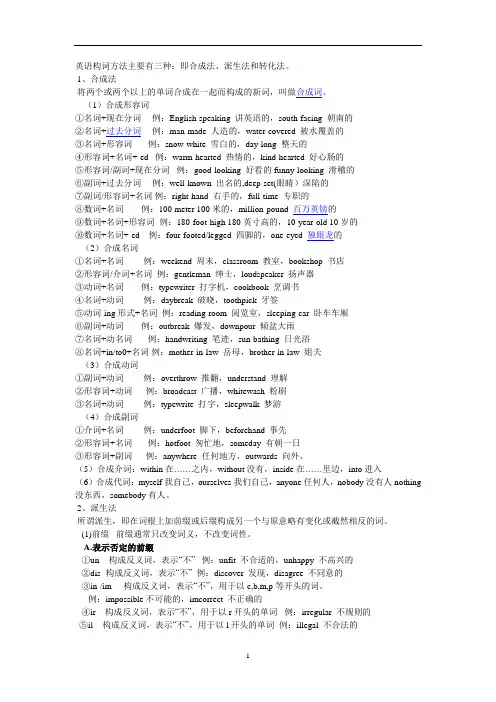
英语构词方法主要有三种:即合成法、派生法和转化法。
1、合成法将两个或两个以上的单词合成在一起而构成的新词,叫做合成词。
(1)合成形容词①名词+现在分词例:English-speaking 讲英语的,south-facing 朝南的②名词+过去分词例:man-made 人造的,water-covered 被水覆盖的③名词+形容词例:snow-white 雪白的,day-long 整天的④形容词+名词+-ed 例:warm-hearted 热情的,kind-hearted 好心肠的⑤形容词/副词+现在分词例:good-looking 好看的 funny-looking 滑稽的⑥副词+过去分词例:well-known 出名的,deep-set(眼睛)深陷的⑦副词/形容词+名词例:right-hand 右手的,full-time 专职的⑧数词+名词例:100-meter 100米的,million-pound 百万英镑的⑨数词+名词+形容词例:180-foot-high 180英寸高的,10-year-old 10岁的⑩数词+名词+-ed 例:four-footed/legged 四脚的,one-eyed 独眼龙的(2)合成名词①名词+名词例:weekend 周末,classroom 教室,bookshop 书店②形容词/介词+名词例:gentleman 绅士,loudspeaker 扬声器③动词+名词例:typewriter 打字机,cookbook 烹调书④名词+动词例:daybreak 破晓,toothpick 牙签⑤动词-ing形式+名词例:reading-room 阅览室,sleeping-car 卧车车厢⑥副词+动词例:outbreak 爆发,downpour 倾盆大雨⑦名词+动名词例:handwriting 笔迹,sun-bathing 日光浴⑧名词+in/to0+名词例:mother-in-law 岳母,brother-in-law 姐夫(3)合成动词①副词+动词例:overthrow 推翻,understand 理解②形容词+动词例:broadcast 广播,whitewash 粉刷③名词+动词例:typewrite 打字,sleepwalk 梦游(4)合成副词①介词+名词例:underfoot 脚下,beforehand 事先②形容词+名词例:hotfoot 匆忙地,someday 有朝一日③形容词+副词例:anywhere 任何地方,outwards 向外、(5)合成介词:within在……之内,without没有,inside在……里边,into进入(6)合成代词:myself我自己,ourselves我们自己,anyone任何人,nobody没有人nothing 没东西,somebody有人。
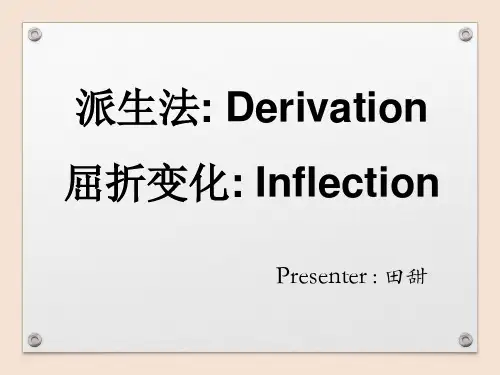
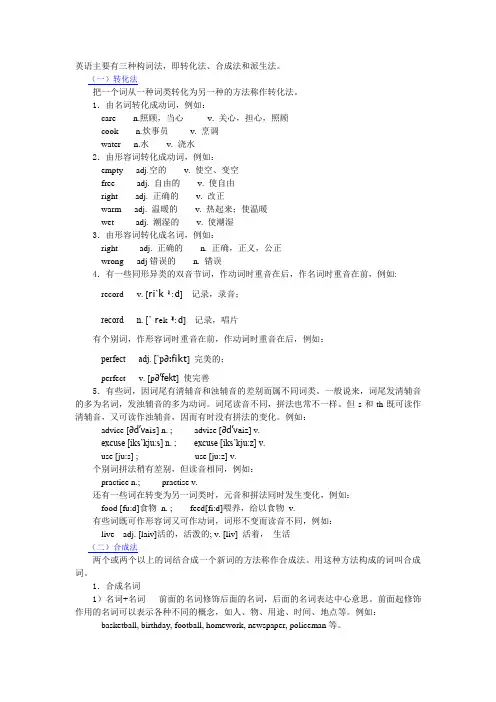
英语主要有三种构词法,即转化法、合成法和派生法。
(一)转化法把一个词从一种词类转化为另一种的方法称作转化法。
1.由名词转化成动词,例如:care n.照顾,当心------ v.关心,担心,照顾cook n.炊事员------v.烹调water n.水------v. 浇水2.由形容词转化成动词,例如:empty adj.空的------v. 使空、变空free adj. 自由的------v. 使自由right adj. 正确的------v. 改正warm adj. 温暖的------v.热起来;使温暖wet adj. 潮湿的------v.使潮湿3.由形容词转化成名词,例如:right adj. 正确的------n. 正确,正义,公正wrong adj错误的------n.错误4.有一些同形异类的双音节词,作动词时重音在后,作名词时重音在前,例如:record v. [ri’k:d] 记录,录音;record n. [’ r e k:d] 记录,唱片有个别词,作形容词时重音在前,作动词时重音在后,例如:perfect adj. [’p∂:f ikt] 完美的;perfect v. [p∂’fekt] 使完善5.有些词,因词尾有清辅音和浊辅音的差别而属不同词类。
一般说来,词尾发清辅音的多为名词,发浊辅音的多为动词。
词尾读音不同,拼法也常不一样。
但s和th既可读作清辅音,又可读作浊辅音,因而有时没有拼法的变化。
例如:advice [∂d’v a i s] n. ; advise [∂d’v a iz] v.excuse [iks’kju:s] n. ; excuse [iks’kju:z] v.use [ju:s] ; use [ju:z] v.个别词拼法稍有差别,但读音相同,例如:practice n.; practise v.还有一些词在转变为另一词类时,元音和拼法同时发生变化,例如:food [fu:d]食物n. ; feed[fi:d]喂养,给以食物v.有些词既可作形容词又可作动词,词形不变而读音不同,例如:live adj. [laiv]活的,活泼的; v. [liv]活着,生活(二)合成法两个或两个以上的词结合成一个新词的方法称作合成法。

英语基本构词法英语最基本的构词法(word formation)有三种:派生(derivation)、合成(compounding)和转化(conversion)。
利用构词法记忆单词,可以记忆成串,举一反三。
Ⅰ。
派生法派生词缀和词根结合,或者粘着词根和粘着词根结合构成单词的方法,叫做派生法(derivation),也称作缀词法。
用派生法构成的词叫做派生词(derivative).派生词的词缀法是英语构词法中最活跃的一种,在英语构词的历史上发挥极其重要的作用。
另外,这种构词法也是我们可以发挥能动性借以扩大词汇量的一种构词法。
词缀分为前缀和后缀两种。
A.前缀1.表示“否定”、“相反”意义的前缀:de— decrease减少;decentralize分散;degrade降级,降低……的地位;dis- dislike不喜欢;disagree不同意;distrust不信任;disappear消失;il— illegal不合法的;illogical不合逻辑的;illegalize宣布……为非法;im— impossible不可能的;immoral不道德的;impractical不现实的;un- unwilling 不情愿的; unbelievable 难以置信的;unnecessary 不必要的等等。
2.表示时间先后的前缀ex— ex-husband前夫;ex-president前总统;fore- foretell语言;foresight先见之明,预见;foresee预见,预知;mid— midterm其中的;midnight午夜;post— postwar战后的;postgraduate研究生;postdoctoral博士后的等等。
3.表示方向位置的前缀ex- export出口;exclude把……排斥在外;external外部的;in— input输入;indoor室内的;inrush涌入;incoming进来的等等.4.表示程度的前缀extra- extraordinary非凡的,惊人的;extracurricular课程以外的;out— outnumber比……多;outrun超过,跑得比……快;sur- surpass超过,优于;surplus剩余的;surrealism超现实主义等等.5.表示数量的前缀bi- bilateral双边的,两边的;bipartisan两党的;bilingual两语的;mono— momocycle独轮车;monologue独白;monodrama独角戏,单人剧;poly- polyacid多酸的;polyclinic多科联合诊所;polycentric多中心的等等。
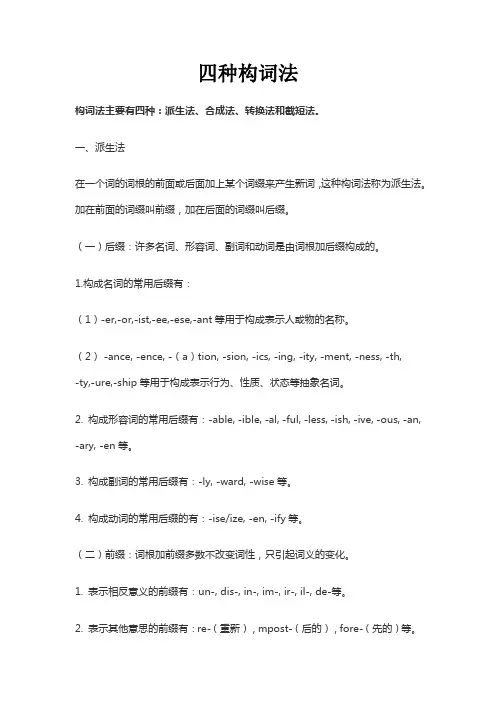
四种构词法构词法主要有四种:派生法、合成法、转换法和截短法。
一、派生法在一个词的词根的前面或后面加上某个词缀来产生新词,这种构词法称为派生法。
加在前面的词缀叫前缀,加在后面的词缀叫后缀。
(一)后缀:许多名词、形容词、副词和动词是由词根加后缀构成的。
1.构成名词的常用后缀有:(1)-er,-or,-ist,-ee,-ese,-ant等用于构成表示人或物的名称。
(2) -ance, -ence, -(a)tion, -sion, -ics, -ing, -ity, -ment, -ness, -th,-ty,-ure,-ship等用于构成表示行为、性质、状态等抽象名词。
2. 构成形容词的常用后缀有:-able, -ible, -al, -ful, -less, -ish, -ive, -ous, -an, -ary, -en等。
3. 构成副词的常用后缀有:-ly, -ward, -wise等。
4. 构成动词的常用后缀的有:-ise/ize, -en, -ify等。
(二)前缀:词根加前缀多数不改变词性,只引起词义的变化。
1. 表示相反意义的前缀有:un-, dis-, in-, im-, ir-, il-, de-等。
2. 表示其他意思的前缀有:re-(重新),mpost-(后的),fore-(先的)等。
二、合成法由两个或两个以上的词合成一个新词,这种构词法称为合成法(compounding)。
合成词之间有的要用连字符连接,有的直接连接在一起。
三、转换法在词行不变的情况下,一个单词由一种词性转换成另一种词性,称为转换(conversion)。
转换后的词义与转换前的词义通常有密切的联系,但有时差异也很大。
有些双音节的词转换后,重音要发生变化。
通常名词重音在前,动词重音在后,有时读音也有不同。
四、截短法即将单词缩写,词义和词性保持不变,主要有截头、去尾、截头去尾等形式。
关于合成法:合成名词:构成方式例词名词+名词weekend周末;名词+动词daybreak黎明;名词+动名词handwriting书法;名词+及物动词+er/or pain-killer止痛药;名词+介词+名词editor-in-chief总编辑;代词+名词she-wolf母狼;动词+名词typewriter打字机。
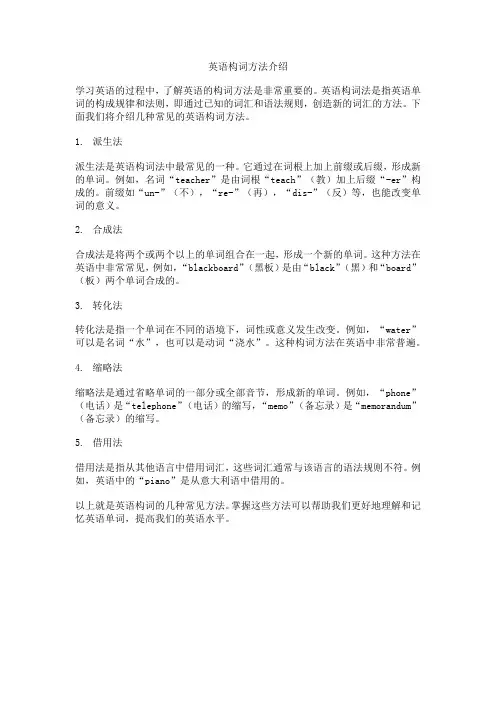
英语构词方法介绍
学习英语的过程中,了解英语的构词方法是非常重要的。
英语构词法是指英语单词的构成规律和法则,即通过已知的词汇和语法规则,创造新的词汇的方法。
下面我们将介绍几种常见的英语构词方法。
1.派生法
派生法是英语构词法中最常见的一种。
它通过在词根上加上前缀或后缀,形成新的单词。
例如,名词“teacher”是由词根“teach”(教)加上后缀“-er”构成的。
前缀如“un-”(不),“re-”(再),“dis-”(反)等,也能改变单词的意义。
2.合成法
合成法是将两个或两个以上的单词组合在一起,形成一个新的单词。
这种方法在英语中非常常见,例如,“blackboard”(黑板)是由“black”(黑)和“board”(板)两个单词合成的。
3.转化法
转化法是指一个单词在不同的语境下,词性或意义发生改变。
例如,“water”可以是名词“水”,也可以是动词“浇水”。
这种构词方法在英语中非常普遍。
4.缩略法
缩略法是通过省略单词的一部分或全部音节,形成新的单词。
例如,“phone”(电话)是“telephone”(电话)的缩写,“memo”(备忘录)是“memorandum”(备忘录)的缩写。
5.借用法
借用法是指从其他语言中借用词汇,这些词汇通常与该语言的语法规则不符。
例如,英语中的“piano”是从意大利语中借用的。
以上就是英语构词的几种常见方法。
掌握这些方法可以帮助我们更好地理解和记忆英语单词,提高我们的英语水平。
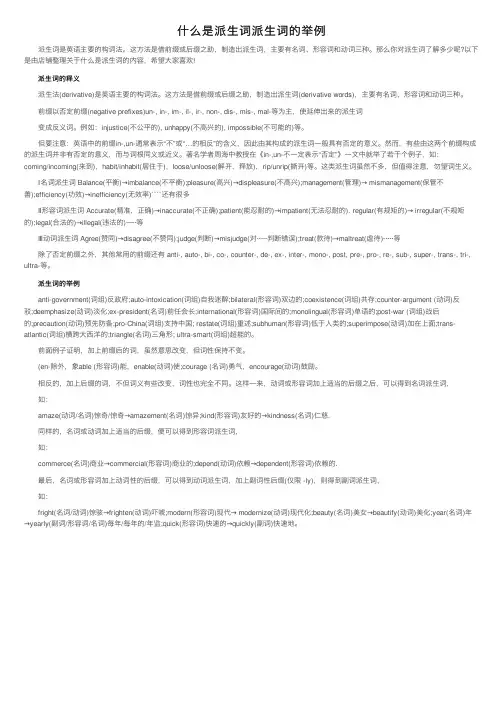
什么是派⽣词派⽣词的举例 派⽣词是英语主要的构词法。
这⽅法是借前缀或后缀之助,制造出派⽣词,主要有名词、形容词和动词三种。
那么你对派⽣词了解多少呢?以下是由店铺整理关于什么是派⽣词的内容,希望⼤家喜欢! 派⽣词的释义 派⽣法(derivative)是英语主要的构词法。
这⽅法是借前缀或后缀之助,制造出派⽣词(derivative words),主要有名词、形容词和动词三种。
前缀以否定前缀(negative prefixes)un-, in-, im-, il-, ir-, non-, dis-, mis-, mal-等为主,使延伸出来的派⽣词 变成反义词。
例如:injustice(不公平的), unhappy(不⾼兴的), impossible(不可能的)等。
但要注意:英语中的前缀in-,un-通常表⽰“不”或“…的相反”的含义,因此由其构成的派⽣词⼀般具有否定的意义。
然⽽,有些由这两个前缀构成的派⽣词并⾮有否定的意义,⽽与词根同义或近义。
著名学者周海中教授在《in-,un-不⼀定表⽰“否定”》⼀⽂中就举了若⼲个例⼦,如:coming/incoming(来到),habit/inhabit(居住于),loose/unloose(解开,释放),rip/unrip(撕开)等。
这类派⽣词虽然不多,但值得注意,勿望词⽣义。
Ⅰ名词派⽣词 Balance(平衡)→imbalance(不平衡);pleasure(⾼兴)→displeasure(不⾼兴);management(管理)→ mismanagement(保管不善);efficiency(功效)→inefficiency(⽆效率)````还有很多 Ⅱ形容词派⽣词 Accurate(精准,正确)→inaccurate(不正确);patient(能忍耐的)→impatient(⽆法忍耐的). regular(有规矩的)→ irregular(不规矩的);legal(合法的)→illegal(违法的)·····等 Ⅲ动词派⽣词 Agree(赞同)→disagree(不赞同);judge(判断)→misjudge(对·····判断错误);treat(款待)→maltreat(虐待)·····等 除了否定前缀之外,其他常⽤的前缀还有 anti-, auto-, bi-, co-, counter-, de-, ex-, inter-, mono-, post, pre-, pro-, re-, sub-, super-, trans-, tri-, ultra-等。
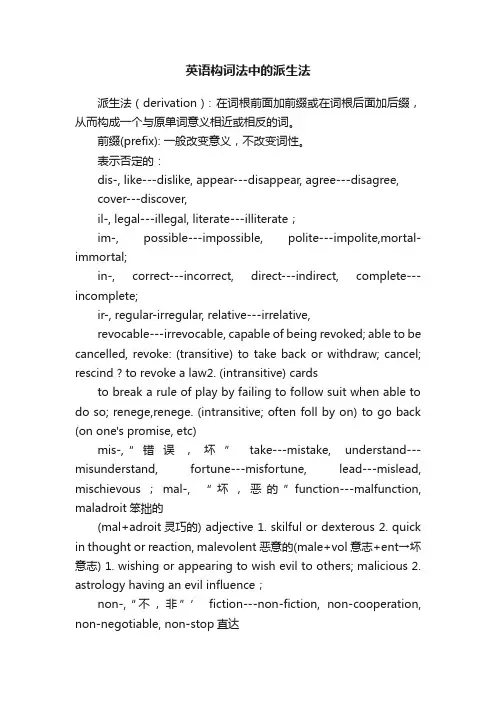
英语构词法中的派生法派生法(derivation): 在词根前面加前缀或在词根后面加后缀,从而构成一个与原单词意义相近或相反的词。
前缀(prefix): 一般改变意义,不改变词性。
表示否定的:dis-, like---dislike, appear---disappear, agree---disagree,cover---discover,il-, legal---illegal, literate---illiterate;im-, possible---impossible, polite---impolite,mortal-immortal;in-, correct---incorrect, direct---indirect, complete---incomplete;ir-, regular-irregular, relative---irrelative,revocable---irrevocable, capable of being revoked; able to be cancelled, revoke: (transitive) to take back or withdraw; cancel; rescind ? to revoke a law2. (intransitive) cardsto break a rule of play by failing to follow suit when able to do so; renege,renege. (intransitive; often foll by on) to go back (on one's promise, etc)mis-,“错误,坏” take---mistake, understand---misunderstand, fortune---misfortune, lead---mislead, mischievous;mal-, “坏,恶的”function---malfunction, maladroit笨拙的(mal+adroit灵巧的) adjective 1. skilful or dexterous 2. quick in thought or reaction, malevolent恶意的(male+vol意志+ent→坏意志) 1. wishing or appearing to wish evil to others; malicious 2. astrology having an evil influence;non-,“不,非”’ fiction---non-fiction, non-cooperation, non-negotiable, non-stop直达的,non-profit, non-commercial;un-, “不,非”happy---unhappy, fair---unfair, like---unlike(不像),certain-uncertain,known-unknown,usual-unusual,important-unimportant, accessable---unaccessable, accountable---unaccountable, fold-unfold,前缀a-,① 加在单词或词根前面,表示”不,无,非”, acentric 无中心的(a+centric中心的) asocial 不好社交的(a+social好社交的) ;amoral 非道德性的(a+moral道德的;注意:immoral apolitical.不关政治的(a+political政治的) anemia 反常的(a+nomal正常的+ous)② 加在单词前,表示”在…,…的” ,asleep 睡着的(a+sleep睡觉),aside 在边上(a+side旁边),ahead 在前地(a+head头),alive 活的(a+live活) awash .泛滥的(a+wash冲洗),alike(相似的,一样的);前缀中的:anti-, “反对,抵抗, against,opposed to,opposite of,instead”,anti-war, antitrust, antibiotic, antioxidant,antibody, antigen, anti-semitic等;auto-, “自动的,self, personally, 表示自己”,automate, automation 自动化,autograph 亲笔,autoalarm 自动报警器,autocriticism 自我批评,autorotation自动旋转,autobiography 自传,autonomous [??'tɑ?n?m?s]a. 自治的;automatic, automatically, autonomy, automobile,automated, autopsy, autograph亲笔签名,手稿, automotive, ,autocrat 独裁者,autocracy,automata, automaton, autoclave, automaker, autoindex自动索引;co-, “共同”,coworker, collegiate, colleague, cooperate;en-, “使”,enlarge, encourage, enhance, enable, enact, enroll, encompass,inter-,“相互,between在---之间”,international, internet, interview, intercontinental洲际的,interchange, interfere, interrupt, interpose,mini-, “小”,minibus, ,miniskirt, miniature, minify, minimum, minimal最低限度的,pre-,“在---之前”,pre-school, pre-reading, preview,precede v. to go or be before (someone or something) in time, place, rank, etc, precedent. a. If there is a precedent for an action or event, it has happened before, and this can be regarded as an argument for doing it again.president, precedent. unprecedented.re-, “再,又,重复”, repeat, rewrite, retell, return, review, rebound, reflect, reclaimsub-,“在下面”,subway, subordinate, submarine, suburban(urban城区),subconscious,subscribe,super-“超,在---之上”,supermarket, superman, superstar, supersonic, superficial, supervise, supernatural,tele-,“远”,telephone, telescope, television, telecommunication, telegram,后缀(suffix): 通常使词由一种词类转化为另一种词类。
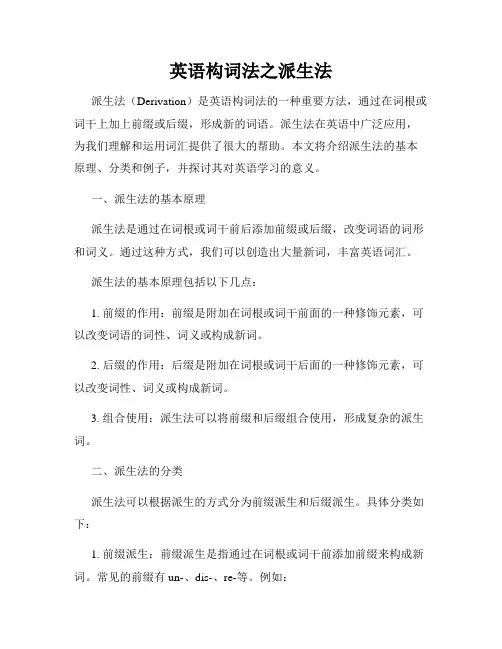
英语构词法之派生法派生法(Derivation)是英语构词法的一种重要方法,通过在词根或词干上加上前缀或后缀,形成新的词语。
派生法在英语中广泛应用,为我们理解和运用词汇提供了很大的帮助。
本文将介绍派生法的基本原理、分类和例子,并探讨其对英语学习的意义。
一、派生法的基本原理派生法是通过在词根或词干前后添加前缀或后缀,改变词语的词形和词义。
通过这种方式,我们可以创造出大量新词,丰富英语词汇。
派生法的基本原理包括以下几点:1. 前缀的作用:前缀是附加在词根或词干前面的一种修饰元素,可以改变词语的词性、词义或构成新词。
2. 后缀的作用:后缀是附加在词根或词干后面的一种修饰元素,可以改变词性、词义或构成新词。
3. 组合使用:派生法可以将前缀和后缀组合使用,形成复杂的派生词。
二、派生法的分类派生法可以根据派生的方式分为前缀派生和后缀派生。
具体分类如下:1. 前缀派生:前缀派生是指通过在词根或词干前添加前缀来构成新词。
常见的前缀有un-、dis-、re-等。
例如:- unlock(解锁)中的un-表示“解除”;- dislike(不喜欢)中的dis-表示“不”;- rewrite(重写)中的re-表示“再次”。
2. 后缀派生:后缀派生是指通过在词根或词干后添加后缀来构成新词。
常见的后缀有-er、-est、-ful等。
例如:- teacher(教师)中的-er表示“从事某种行为的人”;- tallest(最高的)中的-est表示“最”;- helpful(有帮助的)中的-ful表示“充满”。
三、派生法的例子以下是几个通过派生法构成的单词例子:1. 前缀派生的例子- Unhappy(不快乐):un-表示“不”,happy表示“快乐”,通过加入前缀un-,形成新的含义。
- Disappear(消失):dis-表示“否定”,appear表示“出现”,通过加入前缀dis-,形成相反的意义。
- Rebuild(重建):re-表示“再次”,build表示“建立”,通过加入前缀re-,表示再次进行建立。
派生构词法英语英语中的构词法主要有派生法(Derivation)、合成法(Composition)和转换法(Conversion)三大类。
接下来我们将依次分篇幅给读者朋友们解析这三大构词法。
今天重点解析的是现代英语构词法之派生法。
派生法(Derivation)指的是在一个词的词根(root)前面或后面加上某个词缀(affix)来产生新词,这种构词法称为派生法(derivation)或词缀法(affixation).加在前面的词缀叫前缀(prefix),加在后面的词缀叫后缀(suffix)。
一般情况下,前缀往往改变词义,不改变词性;而后缀往往改变词根的词性,有些也涉及意义的变化。
大部分前缀和后缀都有固定的意义,因而许多派生词的词义可以通过词根及词缀的意思推知。
一、前缀法(prefixation)通过在词根前面加词缀构成新词的方法叫前缀法。
一般情况下,它不改变新词的词性,只引起词义的变化。
许多名词、形容词、副词和动词是由词根加后缀构成的。
常见的表示否定或相反意义的前缀有:un-,dis-,in-,im-,ir-,il-等。
un- unhappy不高兴unlock 开锁dis- dislike不喜欢disagree不同意im- impossible不可能的improper不合适的in- informal非正式的incorrect不正确的Ir- irregular不规则的irrelevant不相关的il- illegal不合法的illogical不合理的常见的表达其他意思的前缀▶re-重新、再次regain再次获得reform改革▶mis-错误的misunderstand误解mislead误导▶anti-反、防anti-tank反坦克的anti-social危害社会的▶ex-前ex-president前总统ex-wife前妻▶Pre-预先preview预习predict预言、预测▶Post-之后的postwar 战后的postgraduate 研究生▶fore-之前的forecast预报foresee预见▶Super超级、上层supermarket超市superman超人▶sub-下面的;亚、次subway地铁subtitle副标题▶Inter-之间的,互相interact相互作用international国际的▶trans-跨越、移transport运输translate翻译▶Semi-半semi-final半决赛semiconductor半导体▶Vice-副vice-premier副总理vice-chairman副主席▶Uni-单uniform制服unilateral单方面的▶bi-双bicycle 自行车bimonthly双月的▶multi-多multinational多国的multicolor 多色的▶auto-自动、自主automation 自动化automobile汽车二、后缀法(suffixation)通过在词根后面加词构成新词的方法叫后缀法。
英语构词通常包括六种方法:转化法、派生法、合成法、混合法、截短法和首尾字母结合法.一、【派生法】英语构词法中在词根前面加前缀或在词根后面加后缀,从而构成一个与原单词意义相近或截然相反的新词的方法叫作派生法。
1。
前缀除少数英语前缀外,前缀一般改变单词的意义,不改变词性;英语后缀一般改变词类,而不引起词义的变化。
(1)表示否定意义的前缀常用的有dis—,il—, im-, in-,ir-, mis—, non-,un-等,在单词的前面加这类前缀常构成与该词意义相反的新词.例如:agree同意→disagree不同意fair公平的→unfair不公平的possible可能的→impossible不可能的understand理解→misunderstand误解(2)表示其他意义的前缀常用的有a—(多构成表语形容词),anti- (反对;抵抗),auto— (自动), co- (共同),en— (使),inter—(互相),re- (再;又), sub- (下面的;次;小),tele- (强调距离)等.例如:co-worker 同事,帮手enlarge 使变大cooperate 合作rewrite 重写subway 地铁2.后缀给单词加后缀也是英语构词的一种重要方法.后缀通常会改变单词的词性,构成意义相近的其他词性;少数后缀还会改变词义,变为与原来词义相反的新词。
下面仅作简单介绍.(1)构成名词的后缀常用的有-ence,-(e)r/ —or (从事某事的人),-ese (某地人),-ess (雌性),—ian (精通……的人),—ist (专业人员),-ment (性质;状态),—ness (性质;状态),-tion(动作;过程)等。
例如:differ不同于→difference区别write写→writer作家China中国→Chinese中国人act表演→actress女演员music音乐→musician音乐家(2)构成动词的后缀常用的有-(e)n (多用于形容词之后),-fy (使……化),-ize (使……成为)。
派生法(derivation): 在词根前面加前缀或在词根后面加后缀,从而构成一个与原单词意义相近或相反的词。
前缀(prefix): 一般改变意义,不改变词性。
表示否定的:dis-, like---dislike, appear---disappear, agree---disagree,cover---discover,il-, legal---illegal, literate---illiterate;im-, possible---impossible, polite---impolite,mortal-immortal;in-, correct---incorrect, direct---indirect, complete---incomplete;ir-, regular-irregular, relative---irrelative,revocable---irrevocable, capable of being revoked; able to be cancelled, revoke: (transitive) to take back or withdraw; cancel; rescind ⇒ to revoke a law2. (intransitive) cards to break a rule of play by failing to follow suit when able to do so; renege,renege. (intransitive; often foll by on) to go back (on one's promise, etc)mis-,“错误,坏” take---mistake, understand---misunderstand, fortune---misfortune, lead---mislead, mischievous;mal-, “坏,恶的”function---malfunction, maladroit笨拙的(mal+adroit灵巧的) adjective 1. skilful or dexterous 2. quick in thought or reaction,malevolent恶意的(male+vol意志+ent→坏意志) 1. wishing or appearing to wish evil to others; malicious 2. astrology having an evil influence;non-,“不,非”’ fiction---non-fiction, non-cooperation, non-negotiable, non-stop直达的,non-profit, non-commercial;un-, “不,非”happy---unhappy, fair---unfair, like---unlike(不像),certain-uncertain,known-unknown,usual-unusual,important-unimportant, accessable---unaccessable, accountable---unaccountable, fold-unfold,前缀a-,① 加在单词或词根前面,表示”不,无,非”, acentric 无中心的(a+centric中心的)asocial 不好社交的(a+social好社交的) ;amoral 非道德性的(a+moral道德的;注意:immoral apolitical.不关政治的(a+political政治的) anemia 反常的(a+nomal正常的+ous)② 加在单词前,表示”在…,…的” ,asleep 睡着的(a+sleep睡觉),aside 在边上(a+side旁边),ahead 在前地(a+head头),alive 活的(a+live活) awash .泛滥的(a+wash冲洗),alike(相似的,一样的);前缀中的: anti-, “反对,抵抗, against,opposed to,opposite of,instead”,anti-war, antitrust, antibiotic, antioxidant,antibody, antigen, anti-semitic等;auto-, “自动的,self, personally, 表示自己”, automate, automation 自动化,autograph 亲笔,autoalarm 自动报警器,autocriticism 自我批评,autorotation 自动旋转,autobiography 自传,autonomous [ɔː'tɑːnəməs]a. 自治的;automatic, automatically, autonomy, automobile,automated, autopsy, autograph亲笔签名,手稿, automotive, ,autocrat 独裁者,autocracy,automata, automaton, autoclave, automaker, autoindex自动索引;co-, “共同”,coworker, collegiate, colleague, cooperate;en-, “使”,enlarge, encourage, enhance, enable, enact, enroll, encompass,inter-,“相互,between在---之间”, international, internet, interview, intercontinental洲际的,interchange, interfere, interrupt, interpose,mini-, “小”, minibus, ,miniskirt, miniature, minify, minimum, minimal最低限度的,pre-,“在---之前”,pre-school, pre-reading, preview,precede v. to go or be before (someone or something) in time, place, rank, etc,precedent. a. If there is a precedent for an action or event, it has happened before, and this can be regarded as an argument for doing it again.president, precedent. unprecedented.re-, “再,又,重复”, repeat, rewrite, retell, return, review, rebound, reflect, reclaimsub-,“在下面”, subway, subordinate, submarine, suburban(urban城区),subconscious,subscribe,super-“超,在---之上”,supermarket, superman, superstar, supersonic, superficial, supervise, supernatural,tele-,“远”, telephone, telescope, television, telecommunication, telegram, 后缀(suffix): 通常使词由一种词类转化为另一种词类。
英语构词法的分类
英语构词法是研究英语单词形成和构造规律的一门学科。
根据单词的构造方式和来源,可以将英语构词法分为以下几个分类:
1.派生法(Derivation):派生法是最常见的构词方式之一,通过在词根或词干前后加上前缀或后缀来形成新的单词。
例如,通过在词根“friend”前加上前缀“un-”,我们可以得到“unfriend”,意为“取消朋友关系”。
2.复合法(Compounding):复合法是将两个或多个独立的词组合在一起形成新单词的方式。
这些词可以是名词、动词、形容词等。
例如,“blackboard”(黑板)是由“black”(黑色)和“board”(板)组合而成的。
3.缩略法(Abbreviation):缩略法是将单词或词组的一部分缩短形成新的单词。
例如,“ad”(广告)是“advertisement”的缩略形式。
4.混合法(Blending):混合法是将两个或多个词的一部分合并来形成新的单词。
例如,“brunch”(早午餐)是由“breakfast”(早餐)和“lunch”(午餐)合并而成的。
5.借词法(Borrowing):借词法是指从其他语言中直接借用单词或词组。
英语中有很多借词,如“pizza”(比萨饼)来自意大利语。
6.转化法(Conversion):转化法是通过改变词性或词类来形成新的单词。
例如,“email”(电子邮件)可以作为名词使用,也可以作为动词使用。
以上是英语构词法的一些主要分类。
通过了解这些不同的构词方式,我们可以更好地理解和运用英语单词的形成规律。
英语构词通常包括六种方法:转化法、派生法、合成法、混合法、截短法和首尾字母结合法。
一、【派生法】英语构词法中在词根前面加前缀或在词根后面加后缀,从而构成一个与原单词意义相近或截然相反的新词的方法叫作派生法。
1.前缀除少数英语前缀外,前缀一般改变单词的意义,不改变词性;英语后缀一般改变词类,而不引起词义的变化。
(1)表示否定意义的前缀常用的有dis-, il-, im-, in-, ir-, mis-, non-, un-等,在单词的前面加这类前缀常构成与该词意义相反的新词。
例如:agree同意→disagree不同意fair公平的→unfair不公平的possible可能的→impossible不可能的understand理解→misunderstand误解(2)表示其他意义的前缀常用的有a-(多构成表语形容词), anti- (反对;抵抗), auto- (自动), co- (共同), en- (使), inter- (互相), re- (再;又), sub- (下面的;次;小), tele- (强调距离)等。
例如:co-worker 同事,帮手enlarge 使变大cooperate 合作rewrite 重写subway 地铁2.后缀给单词加后缀也是英语构词的一种重要方法。
后缀通常会改变单词的词性,构成意义相近的其他词性;少数后缀还会改变词义,变为与原来词义相反的新词。
下面仅作简单介绍。
(1)构成名词的后缀常用的有-ence,-(e)r/ -or (从事某事的人),-ese (某地人),-ess (雌性),-ian (精通……的人),-ist (专业人员),-ment (性质;状态),-ness (性质;状态),-tion(动作;过程)等。
例如:differ不同于→difference区别write写→writer作家China中国→Chinese中国人act表演→actress女演员music音乐→musician音乐家(2)构成动词的后缀常用的有-(e)n (多用于形容词之后),-fy (使……化),-ize (使……成为)。
中学英语中常见的几种英语单词构词方法英语的构词法主要有:合成法,转化法,派生法,混成法,截短法和词首字母缩略法。
1、合成法:如:spaceship, headache, basketball, playground等等。
2、转换法:(1)形容词→动词,如:dry(干燥的)→dry(弄干), clean(干净的)→clean (打扫,弄干净),等等。
(2)动词→名词,如:look, walk, rest, work, study, swim, go, talk等等。
(3)名词→动词,如:hand(手)→(传递),face(脸)→(面对)等等。
(4)形容词→副词,如:early→early, fast→fast等等。
(5)副词→连词,如:when(什么时候)→(当……时候),等等。
(6)介词→副词,如:in(到……里)→(在里面;在家),on(在…上)→(进行,继续),等等。
3、派生法:(1)派生名词:①动词+er/or如:inventor, learner,②动词+ing 如:swimming,③动词+(t)ion 如:congratulation,pollution④形容词+ness 如:kindness,carelessness,⑤其他,如:knowledge(2)派生形容词:①名词+y如:snowy, sunny,②名词+ful 如:hopeful, beautiful③动词+ing/ed如:interesting, follwing,④friendly 如:daily(每日的),⑤dangerous如:nervous,delicious⑥Chinese; Japanese⑦English ⑧French ⑨German⑩国名+(i)an,(3)派生副词:①形容词+ly如:slowly, angrily, full→fully,②其它,如:good→well, possible→possibly等等。